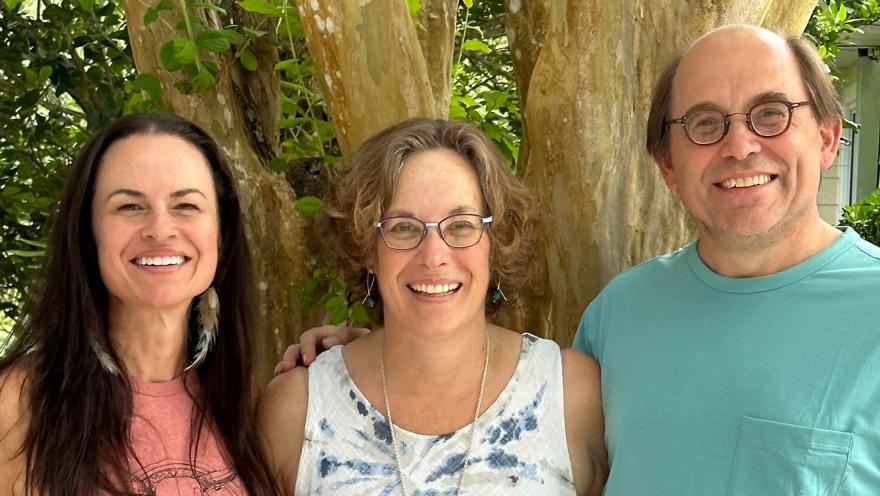Clinical trials are the most reliable and fastest way to translate promising laboratory science into new treatments – and ultimately a cure – for ALS. Today we are shining a spotlight on Dr. Laura Ranum, who is conducting a phase 2 trial for C9orf72-linked familial ALS with support from the Association’s Clinical Trial Awards Program.
What if the most common type of familial ALS could be treated with an inexpensive drug backed by decades of worldwide use and a strong safety record? It seems like something that could only be dreamed up in Hollywood, yet this is exactly what Laura Ranum, Ph.D., and her colleagues at the University of Florida are currently investigating.
Ranum and her team are conducting a small phase 2 open-label clinical trial to test the safety and therapeutic potential of metformin for people with ALS caused by a mutation in the C9orf72 gene. This mutation occurs when six letters of DNA that make up part of the gene’s genetic code – GGGGCC – are repeated hundreds of extra times. This “repeat expansion,” as it’s commonly called, creates up to six unexpected and toxic proteins.
“We called these rogue proteins repeat associated non-AUG, or RAN, proteins. And these proteins gunk up the works, aggregating inside neurons and other brain cells,” said Ranum, who serves as director of the University of Florida’s Center for NeuroGenetics and the Kitzman Family Professor of Molecular Genetics and Microbiology. “We have strong evidence in mouse models that RAN proteins are really an important driver of the disease. Other people in other labs have generated similar data that RAN proteins are toxic, and it would be a good idea to get rid of them. And so that’s what we’re trying to do.”
Metformin was approved by the FDA in 1994 to control blood sugar levels in people with type 2 diabetes – a use seemingly a universe away from treating familial ALS. But as Ranum was listening to a talk by longtime collaborator Nahum Sonenberg, Ph.D., describing how this drug normalized protein production via RNA translation and improved the condition of a mouse model of Fragile X Syndrome, something clicked.
She immediately asked Tao Zu, Ph.D., a research assistant professor who works in her lab, to test metformin in ALS tissue cultures to see if the drug would lower levels of the abnormal RAN proteins produced by the C9orf72 gene mutation.
“I thought, ‘This isn’t going to work, but what a dream it would be if it did because then you could repurpose that drug very quickly and get it into clinical trials,’” Ranum recalled.
A Dream Come True?
The tissue culture experiments – and subsequent tests in mouse models of C9orf72-linked ALS – showed that metformin did in fact lower RAN protein levels. In the mouse models, metformin also improved neuroinflammation, improved behavior and increased motor neuron survival.
“That was really exciting to us, and that’s why we thought we should cautiously and quickly move forward to see what happens in human patients,” Ranum said.
In January 2020, Ranum, in collaboration with several University of Florida colleagues – James Wymer, M.D., a professor of neurology; Emily Plowman, Ph.D., an associate professor of speech, language and hearing sciences; David Vaillancourt, Ph.D., a professor and chair of the department of applied physiology and kinesiology; and Timothy Garrett, Ph.D., an associate professor of pathology, immunology and laboratory medicine – initiated an open-label phase 2 clinical trial with the hope of enrolling 18 people with C9orf72-linked ALS. (In an open-label trial, all participants receive the drug.)
Despite its small size, the trial faced some large hurdles. Not only did the group have to contend with the upheaval caused by the COVID-19 pandemic, but they also had to figure out funding.
“Many of the clinical trials that occur are supported by pharma, but big pharma is not really interested in an off-label, cheap drug,” Ranum said. “So, we have to rely on public funding to push this through and see if it works.”
In late 2022, Ranum received a Clinical Trial Award worth $500,000 over two years to help bolster recruitment and complete the early-stage trial.
The results of this trial will be crucial to determine whether the dream of metformin treatment for C9orf72-linked ALS can be translated into reality. If the results show that the drug can reduce RAN proteins in cerebral spinal fluid or blood, or there are improvements in other biomarkers, the next step would be to run a larger, multi-center, placebo-controlled trial.
“I hope that metformin will be part of the solution,” Ranum said. “It may be too wishful to think it will fix everything, but if it goes partway and reduces the RAN proteins, then I think that’s a good starting point to improve it and make it better.”
More information about clinical trials can be found HERE.
To continue to follow stories about people living with ALS in the community and learn more about the disease, subscribe to receive our weekly blogs in your inbox HERE or follow us at als.org/blog.
If you would like to receive monthly ALS research updates, SUBSCRIBE to our newsletter, Research Matters.


Comments
I have the c9 gene and on Metformin
I have the C9orf72 mutation and will be getting Metfornin soon. How is working for you, Heather?
I have the C9ORF72 gene as well. Was told by the VA they won't diagnose me with ALS to receive treatments.
Sorry, Travis, for what you are going through. You can find ALS clinics in your area here: https://www.als.org/clinics.
Join the conversation. Please comment below.